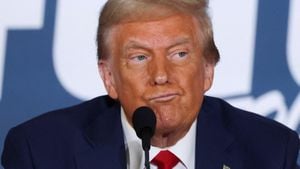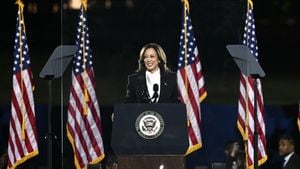North Korea’s recent missile tests have sent ripples through the international community, highlighting the regime’s resolve in solidifying its military capabilities amid growing tensions. Kim Jong-un, the nation’s leader, touted the country’s latest intercontinental ballistic missile (ICBM) test as "appropriate military action" against its perceived adversaries, particularly the United States and South Korea, during recent military drills. The sentiment echoed across state media, reinforcing the view of North Korea as under persistent threat from external forces.
During these military exercises, North Korea successfully launched its longest-range ICBM, which was described as part of the regime’s efforts to bolster its defenses and national security. Kim emphasized this test was not just strategic but necessary for preparing against potential attacks from the U.S. and its allies. According to analysts, this latest missile is North Korea's way of showcasing its technological advancements and its defiance against international criticism.
This provocative action occurs as South Korea strengthens its alliance with the U.S., which could escalate regional tensions. The U.S. recently reaffirmed its commitment to defense treaties with South Korea, promising the deployment of advanced weaponry and troops to the region as deterrence. Observers interpret these moves as part of the broader strategy to counter North Korea’s growing nuclear arsenal and its aggressive posture.
Experts suggest the missile test serves multiple purposes for North Korea. Firstly, it enhances Kim’s domestic credibility by portraying him as the protector of the nation. Secondly, it acts as leverage in diplomatic negotiations with the West by introducing uncertainty and raising fears about North Korea’s capabilities. This duality has become central to North Korea's diplomatic strategy, as the regime seeks concessions from the U.S. and acknowledges the military might as indispensable.
North Korea’s weapons program, which has repeatedly drawn condemnation from the global community, is viewed not merely as aggressive posturing but as a strategic tool for the Kim administration. The regime is known for its secrecy, making external assessments of its capabilities challenging. Nonetheless, analysts believe the advancements reflect considerable technical progress, with North Korea now asserting it can strike the U.S. mainland directly.
The ramifications of these developments could extend beyond military circles, affecting global politics and economics. Increased tension on the Korean peninsula raises concerns about escalations leading to military conflict, which would have severe economic consequences regionally and globally. Market analysts are keeping close tabs on these geopolitical shifts, wary of potential impacts on international trade and security.
Public opinion within North Korea is highly controlled, but state media presents these tests as national achievements, reinforcing the narrative of resilience and strength against foreign adversaries. Propaganda outlets play up the notion of defending the homeland, which serves to unify the populace under the regime's leadership.
Further complicity arises from the humanitarian aspect of North Korea’s priorities. While Kim Jong-un invests heavily in military capabilities, the nation continues to grapple with dire economic hardships and food insecurity. The international response to missile tests has frequently included sanctions aimed at curtailing financial resources directed toward the military, but their effectiveness remains debatable as the regime reportedly pivots to illicit trade practices and other covert means to sustain its weapon programs.
Efforts to engage North Korea diplomatically have been consistently undermined by its unpredictable actions. Previous summits between Kim and former U.S. President Donald Trump brought hope for denuclearization talks, but as missile tests resumed, those hopes faded. Analysts now debate whether a fresh approach, perhaps focusing on economic incentives, might yield positive outcomes.
Simultaneously, the regional players are reevaluing their strategies. South Korea is likely to increase its own military exercises and seek enhanced cooperation with the U.S. Japan, under its new leadership, is also set to reconsider its defense posture, possibly increasing its military budget and capabilities.
All eyes continue to be on North Korea—it’s unclear how provocative actions will shape the international community’s response. The U.S. has expressed unwavering support for South Korea and Japan, prompting dialogue and consideration of countermeasures to any anticipated attack. The interconnectedness between missile tests and broader geopolitical strategies keeps the spotlight shining on this enigmatic nation.
While assertions from Pyongyang proclaim self-defense and deterrence against aggressors, analysts worry these tests may prompt counteractions leading to spiraling tensions. Only time will tell how this complex interplay will evolve, but the world remains steadfastly attentive as North Korea’s nuclear posture continues to raise alarms.



